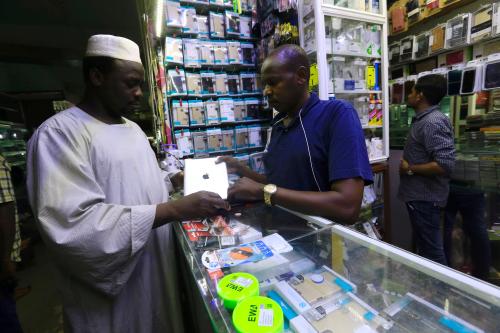Below is a viewpoint from Chapter 5 of the Foresight Africa 2018 report, which explores six overarching themes that provide opportunities for Africa to overcome its obstacles and spur inclusive growth. Read the full chapter on African technology, innovation, and digital potential here.
Agricultural technologies—improved crop varieties, fertilizers, agro-chemicals, inoculants, and crop management methods—have led to increased global food production at an impressive 3-4 percent on average over the past six decades. In all regions but Africa, crop yields have remained a step ahead of population growth, helping free the world of hunger and famine. Agricultural technologies have also helped dispel a long-held misconception that tropical regions cannot be as productive as the temperate regions of the world. Indeed, new crop varieties adapted to the tropics, combined with good soil science, turned tropical Brazil into one of the major breadbaskets of the world in a few decades. It also led to the green revolutions throughout Asia and other parts of the world. It can safely be said that agriculture as a science sustains agriculture as a business.
Yet decades after the green revolutions in other parts of the world, Africa has not managed to keep up with this trend. Less than a third of African farmers use improved crops, and fertilizer use is the lowest in the world. And the consequences are dire. One in five Africans—160 million people—still go to bed hungry at night, and a large number of children are malnourished, with one-third of Africa children moderately to severely underweight. The power of agricultural technologies to raise productivity and combat malnutrition are desperately needed.
Less than a third of African farmers use improved crops, and fertilizer use is the lowest in the world.
There are some success stories, and the winds of change have started to blow. Efforts in individual countries like Ethiopia, Malawi, and Nigeria show that merely switching to modern crop varieties and modest fertilizer use doubles crop yields and reduces food and nutrition insecurity. Nutrient-dense varieties of crops are also becoming an important part of a powerful arsenal to combat the “hidden hunger” of micronutrient deficiency that robs Africa’s children of their future by compromising their immune systems, sight, and cognitive abilities. Simple storage and processing technologies—including hermetically sealed bags and low-cost extruders (machines used in food processing to create uniform outputs such as pasta and breakfast cereals)—eliminate post-harvest losses and add value to the harvest.
More recently, digital technologies have started to transform the lives of small-holder farmers, offering them real-time access to market information and hassle-free direct access to subsidized inputs through efforts such as the e-wallet system, which allows African small-holder farmers to bypass decades of weak public institutions and corruption. Adding market access to these productivity-boosting technologies raises farmers’ incomes and improves rural livelihoods.
In an effort to accelerate this positive momentum, the African Development Bank is rolling out efforts to rapidly expand access for small-holder farmers—the majority of whom are women—to 21st century agricultural technologies. By taking a regional and agro-ecology crop approach rather than one dictated by national borders and policies, we can deliver high yield and nutritious crop varieties of rice, maize, wheat, sorghum, millet, and cassava, and improved breeds of sheep, goat, and fish to millions of farmers, as well as combat pests and disease threats.
Ultimately, the goal is a paradigm shift from “agriculture as a way of life” to “agriculture as a business” that will foster the positive feedback loop of increased gainful employment, rising incomes, and better nutrition and quality of life throughout the continent. Technologies hold the key to making this happen.
The Brookings Institution is committed to quality, independence, and impact.
We are supported by a diverse array of funders. In line with our values and policies, each Brookings publication represents the sole views of its author(s).







Commentary
Foresight Africa viewpoint – Fulfilling Africa’s agriculture potential: The role of technology
January 19, 2018